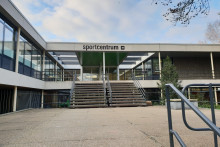According to the rules, public funds must not be used to finance private activities. Therefore, higher education institutions are prohibited from using taxpayers’ money to establish commercial services, since this would constitute ‘state aid’.
Yet, there are always grey areas. How strictly should this principle be applied? The Ministry of Education has altered the rules and will enforce them more rigorously starting in 2026. This promises to impose significant constraints compared to the previous situation.
For many years, research universities and large universities of applied sciences have offered their own sports facilities, allowing students and staff to engage in sports inexpensively. They also frequently have their own theatres, which can be used either for free or at a minimal charge. Additionally, canteen prices are typically lower than those found in town.
Higher prices
‘Catering and sports facilities, for example, are in principle private amenities’, the Ministry of Education has written to all secondary vocational, higher professional education and university governing bodies. According to the letter, facilities ranging from sports halls to canteens cannot be offered to students and staff ‘on a voluntary basis, free of charge, or at a minimal fee’. Consequently, prices will soon have to increase.
Students in hospitality and sports courses, who need to learn how to cook and acquire sports skills, are the only exception. These programmes can offer the facilities without charge.
A spokesperson for the Ministry of Education says: ‘Educational institutions can invest in sports facilities, but must then charge students a market rate to use them.’
The same will apply to cultural activities, from lecture series to creative courses. ‘These may be offered, provided the pricing is market-based.’
Botanic gardens
The law does allow universities to take account of the ‘personal development of students’. However, the ministry spokesperson notes, the practical application of this has been increasingly clearly defined in recent years. ‘For instance, it has been clarified that sports facilities do not fall under this category.’
The realisation of what this means has set alarm bells ringing. Utrecht University, for example, is concerned about its botanic gardens and the university museum. If they continue their investments, the government may decide to claw back those funds. Board member Margot van der Starre told Utrecht University magazine DUB: ‘In the worst-case scenario, the university may see its government funding for 2025 cut.’
Resistance
University association UNL, on behalf of all universities, opposes the new interpretation. ‘We view these activities as integral to our public mission’, says spokesman Ruben Puylaert. ‘This new interpretation could certainly mean that these facilities will disappear.’ The concern goes beyond the sports facilities, he warns. It could also have implications for university museums, knowledge valorisation and continuing education as part of lifelong learning.
The strict interpretation is also incorrect, UNL believes. As the then Secretary of State (and later Prime Minister) Mark Rutte (VVD) wrote in 2005: the provision of facilities for students is permissible ‘if it serves to foster social bonding and a conducive study environment, thus positively impacting student success rates’.
The Netherlands Association of Universities of Applied Sciences agrees. ‘This matter also has our attention’, a spokesperson says. ‘We are particularly concerned about lateral entrants to teacher training programmes. Their training is also considered a private activity, whereas the training of teachers is recognised as a public task.’
Opposition
Opposition parties are voicing concerns. ‘It’s quite strange to introduce new policies without any clear reason’, says Jan Paternotte (D66). ‘Yet, it aligns perfectly with Bruins’ agenda of making higher education in the Netherlands as unappealing as possible.’ Life is expensive enough for students, he believes, ‘and now the government wants to take away student benefits that have benefited generations’.
Luc Stultiens (GroenLinks-PvdA) is equally taken aback. He promptly submitted parliamentary questions regarding what he describes as market forces going haywire. He believes that Bruins is surpassing Mark Rutte in terms of right-wing policies. If the minister does not change course, Stultiens wants to know what steps he will take ‘to avert any negative consequences of this decision, such as declining mental health, cultural alienation and reduced social cohesion’.
The written questions to the ministry were submitted by DUB.





